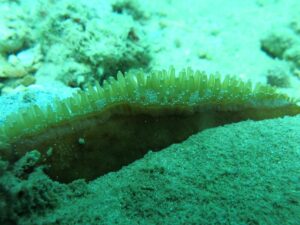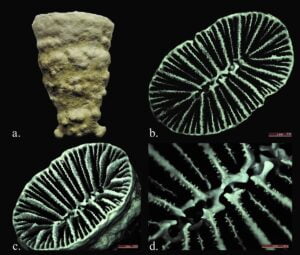Environment & Ecology
In News: Scientists have recorded four species of azooxanthellate corals for the first time from Indian waters
- These new corals were found from the waters of Andaman and Nicobar Islands.
- Azooxanthellate corals are a group of corals that do not contain zooxanthellae and derive nourishment not from the sun but from capturing different forms of plankton.
- These groups of corals are deep-sea representatives, with the majority of species reporting from between 200 m to 1000 m.
- Their occurrences are also reported from shallow coastal waters. Zooxanthellate corals, meanwhile, are restricted to shallow waters
- All the four groups of corals are from the same family Flabellidae.
- Truncatoflabellum crassum, T. incrustatum, T. aculeatum and T. irregulare
- Under the family Flabellidae were previously found from Japan to the Philippines and Australian waters while only crassum was reported within the range of Indo-West Pacific distribution including the Gulf of Aden and the Persian Gulf.
- Azooxanthellate corals are a group of hard corals and the four new records are not only solitary but have a highly compressed skeletal structure.


Hard corals
- Hard corals grow in colonies and are often referred to as “reef-building corals.”
- Hard corals create skeletons out of calcium carbonate, a hard substance that eventually becomes rock.
- Overtime, this rock builds up to form the foundation of a coral reef and provides a structure upon which baby corals can settle.
- Hard corals can be further separated into two sub-groups.
Zooxanthellate
- The zooxanthellate (reef-building or hermatypic) corals are ones that depend on zooxanthellae algae for nutrients.
- These shallow water corals have a major reef-building function.
- They are generally found in clear water less than 50 metres deep as the algae need light for photosynthesis.
Azooxanthellate
- The azooxanthellate (deep water or ahermatypic) corals do not contain zooxanthellae and therefore gain their nutrition solely from filtering plankton from seawater.
- These isolated, solitary or colonial forms rarely build big constructions
Source: The Hindu
Previous Year Questions
Q.1) Consider the following statements: (2018)
- Most of the world’s coral reefs are in tropical waters.
- More than one-third of the world’s coral reefs are located in the territories of Australia, Indonesia and Philippines.
- Coral reefs host far more number of animal phyla than those hosted by tropical rainforests.
Which of the statements given above is/are correct?
- 1 and 2 only
- 3 only
- 1 and 3 only
- 1, 2 and 3













